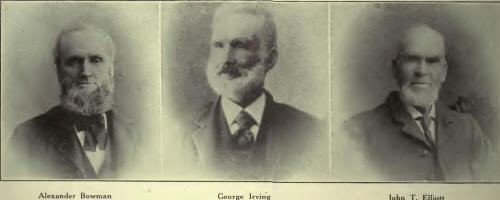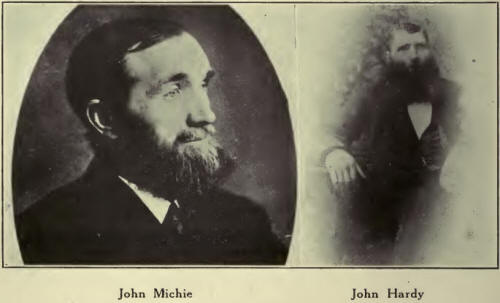|
ON January 31, 1879, The Rev. James Breckenridge of
Streetsville preached and moderated in a call to The Rev. Malcolm C.
Cameron. Knox Church, Milton, also gave a' call to him on February 24th,
and his induction took place on March 25th, The Rev. James Breckenridge,
The Rev. John Pringle of Georgetown and The Rev. Mr. McLaren of
Cheltenham taking their parts in the service. Mr. Cameron was a recent
graduate of Knox College, physically strong and vigorous, of sociable
disposition, and very earnest in his work as preacher and pastor. There
was a spiritual quickening in both congregations, and a new interest was
manifested by an improved attendance on the services. In the first years
of his ministry considerable additions in both Churches were made to the
membership.
At a meeting of Session in Knox Church on February 1,
1879, a petition from a number of people in the congregation was read
requesting permission to use an organ in the Church services as an aid
in congregational singing, and the request was granted. In Boston Church
at the Annual meeting, 1882, it was decided to make use of an organ in
the services of worship. A little later an organ was purchased, but when
it was finally put in place, a good woman felt that she could not
worship God where such a thing was present. A few more conscientious
objectors compromised with themselves for a time by refusing to join in
the singing. All, however, in due season became perfectly satisfied, or
comfortably accepted the situation.
Another new thing took place. At a meeting of the Session
in Knox Church on September 21, 1880, it was decided to sing Hymns as
well as Psalms in the public worship of both congregations. It had for a
long time been believed by many people that there were no divinely
inspired songs outside of the Old Testament Psalter. Certainly it was at
least accepted by them that “he that believeth should not. make haste,”
but should patiently wait until he became quite sure that the Holy
Spirit could inspire good men and women to write spiritual songs in
these later days. At last, however, it came to appear reasonable that
the Spirit of God might still inspire people to do this, that spiritual
songs having in them a Gospel message, and expressing the experiences
and aspirations of the Christian heart might, and should, be sung in
Christian worship.

On June 6, 1880, John T. Elliott and Alexander Bowman
were ordained as elders, and on March 7, 1886, George Irving and John
Michie were ordained to the same office.
Mr. Cameron was quite zealous in the cause of temperance,
and to some this zeal was not acceptable. They thought ministers should
stick to the gospel and not meddle with any of these disturbing social
and reform questions.
The custom of a Church service on Friday, Saturday and
Monday in connection with the Lord’s Supper on the Sabbath began now to
give way to a preparatory service on Friday.
At the annual meeting in 1883 the matter of building more
sheds for horses was considered. It is probable that the south shed was
erected that summer. Edwin Thornton was the builder.
At a meeting in Boston Church on January 26, 1886,
managers from Knox Church presented a request that the Boston people
consent that the forenoon service should be held in Milton, and the
afternoon service in Boston Church. The matter required time for
consideration, and the longer it was considered the more clearly it was
seen that it would be better that the congregations should become
separate, self-sustaining charges. Each congregation seemed strong
enough to support a minister, and the plan commended itself to both.
While the separation of the two congregations was pending
The Rev. Mr. Cameron decided that under the circumstances it would be
best for him to resign. On April 25, 1887, at a meeting of Session,
elders from both Churches being present, Dr. David
Robertson was appointed to represent it at the meeting of
Presbytery as being favorable to the acceptance of Mr. Cameron’s
resignation. The Boston congregation at its meeting on May 3rd, 1887,
appointed Robert Stewart and Alexander Bowman to represent it at
Presbytery, and instructed them to concur with Mr. Cameron in asking
that his resignation be accepted, inasmuch as he believes that his
action is for the interests of both congregations. The meeting also
passed a resolution expressing its hope that Mr. Cameron would have
abundant success and happiness in whatever field he might be called to
labor. Presbytery accepted his resignation, and shortly afterwards he
received a call to Knox Church, Harriston, Ontario .
The elders who served in the pastorate of Mr. Cameron
were John Hardy, John T. Elliott, John Michie, George Irving, Alexander
Bowman, John Turnbull, W. H. Lindsay, J. H. Fraser, Dr. D. Robertson and
H. Patton.
During the vacancy the Rev. Mr. Murray of Streetsville
was moderator. On October 3, 1887, a meeting of the Boston congregation
was held, and Robert Stewart and George Irving were appointed to attend
Presbytery on October 5, and request it to consent to the separation of
Boston and Knox congregations, and that each be constituted a
self-sustaining charge. The delegates" were authorized to promise $800
and a free manse to a pastor. Knox congregation took steps in the same
direction. The pastor of St. Andrew’s Church, Milton, had resigned, and
a number of members and adherents of the Church expressed a readiness to
unite with Knox Church in order that there might be in Milton a
self-sustaining Presbyterian congregation. A subscription list was
circulated, and $800 secured in pledges for a minister’s support.
At a congregational meeting of Knox Church the following
resolution was moved by Francis Barclay, and seconded by John White, and
carried:—“That the congregation of Knox Church, Milton, believing it to
be for the best interests of the congregation that a dissolution of the
union hitherto existing between the congregations of Boston and Knox
Churches take place as soon as the necessary steps can be taken for the
purpose, beg to express the kind feelings they
entertain towards the Boston congregation, and call to their remembrance
with pleasure the agreeable intercourse they have had in days gone by,
and trust that although the congregational union may be dissolved that
the union of heart springing from Christian feelings may be long
continued.”

The Session, which had always acted as the Session of
both congregations, met in Knox Church, Milton, on September 5, 1887,
and appointed Dr. D. Robertson and John Hardy to attend the meeting of
Presbytery in Toronto on the next day, and present the following
resolution of the Session:—“Whereas the congregation of Knox Church,
Milton, has for some years seen the desirability of having a morning and
evening service, and having found it impossible to obtain that privilege
without encroaching on the best interests of their sister Church in
Esquesing, this combined Session of Boston and Milton Churches hereby
records its unalloyed pleasure at the prospect of the congregation of
Knox Church, Milton, to stand alone, and learn with satisfaction that
they find themselves financially strong enough to 'keep a pastor of
their own, and thereby obtain the desired service morning and evening,
of which they stand in need, and it being agreeable to all parties
concerned this Session would recommend that a separation of the
congregations take place as early as can be conveniently arranged.”
W. G. WALLACE, Mod’r pro tern.
W. H. LINDSAY, Clerk.
The last communion service of Knox Church, Milton, and
Boston Church, Esquesing, as united congregations, took place in Boston
Church on Sabbath, October 9, 1887. The moderator pro tom., The Rev.
James Murray of Streetsville, conducted the very impressive service, and
referred in appropriate terms to this last communion together of the two
congregations, which had been united since 1855, and was now this day
separated at their own desire and by edict of the Presbytery of Toronto.
The elders who officiated at the service were John Hardy,
John Michie, George Irving, Alexander Bowman, David Robertson, Hugh
Patton and-Walter H. Lindsay. |
